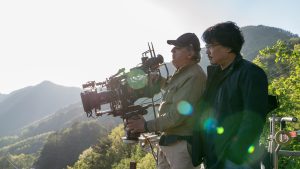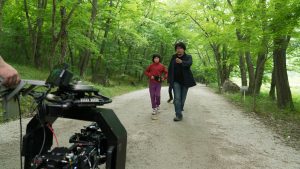Bong Joon Ho, celebrity interviews, Lily Collins, movies, Netflix, Okja, Paul Dano, Steven Yeun, Tilda Swinton
June 28, 2017
by Carla Hay
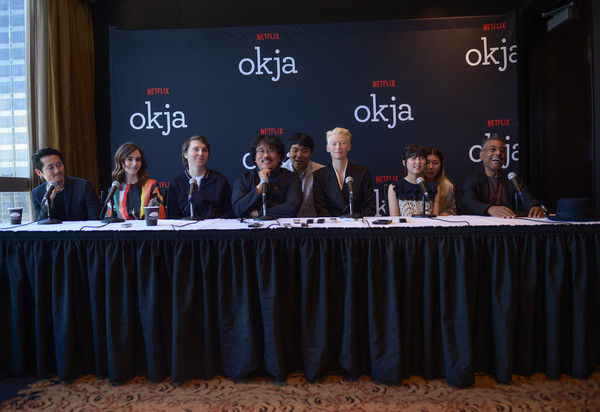
Genetically modified organisms in food, animal rights and corporate greed are issues that are explored in the Netflix film “Okja,” a satirical drama directed by Bong Joon Ho. “Okja” is available for streaming on Netflix and has a limited release in cinemas. For 10 idyllic years, young Mija (played by An Seo Hyun) has been caretaker and constant companion to Okja—a massive animal and an even bigger friend—at her home in the mountains of South Korea. But that changes when a family-owned multinational conglomerate Mirando Corporation takes Okja for itself and transports her to New York, where image-obsessed and self-promoting CEO Lucy Mirando (played by Tilda Swinton) has big plans for Mija’s dearest friend. She is aided by her right-hand man, Frank Dawson (played by Giancarlo Esposito). Also interested in Okja is Dr. Johnny Wilcox (played by Jake Gyllenhaal), an eccentric TV personality who hosts his own show about nature.
With no particular plan but single-minded in intent, Mija sets out on a rescue mission, but her already daunting journey quickly becomes more complicated when she crosses paths with disparate groups of capitalists, demonstrators and consumers, each battling to control the fate of Okja, while all Mija wants to do is bring her friend home. “Okja” also stars Paul Dano, Steven Yeun and Lily Collis as animal-rights activists who are determined to help save Okja and other animals that are being bred for human consumption. Here is what Swinton, Dano, Yeun, Collins, Hyun and Bong had to say at a New York City press conference for “Okja.”

What was the most challenging thing about blending the emotions and the action in “Okja” that An Seo Hyun had to convey?
Hyun: On set, I was always thinking about how Mija would perceive all the things that are happening. I would say she was in a “Mija” state. Director Bong helped me constantly think about “Why Mija would do this?” and “What would Mija think?” That helped me maximize how Mija would think in the story.
Bong: An is very experienced, and she is very energetic and curious. She has enough energy to confront Tilda. And because of this high energy, when we filmed those scenic mountain scenes, we tried to distract Mija as best as we could. I would talk about catering, talk about snacks. I tried to distract her because if she tried too hard, the performance wouldn’t come out right. There are so many great actors and actresses around her, she might have been pressured into a poor performance. I did my best to try to relax her as much as possible.

Tilda, what can you say about your performance in “Okja”?
Swinton: It’s a very simple and relaxed business when you’re working with someone like Director Bong, who invited a kind of playfulness. He just described the relaxedness in all of his comedies, not just performance, but in all departments. Being a very intelligent person in what he knows is that he really wants people to be relaxed and bring something fresh and creative. That’s an environment that I love. It’s like a playpen, like a sandbox to me. It’s like kindergarten, especially working with him. He’s like my playmate.
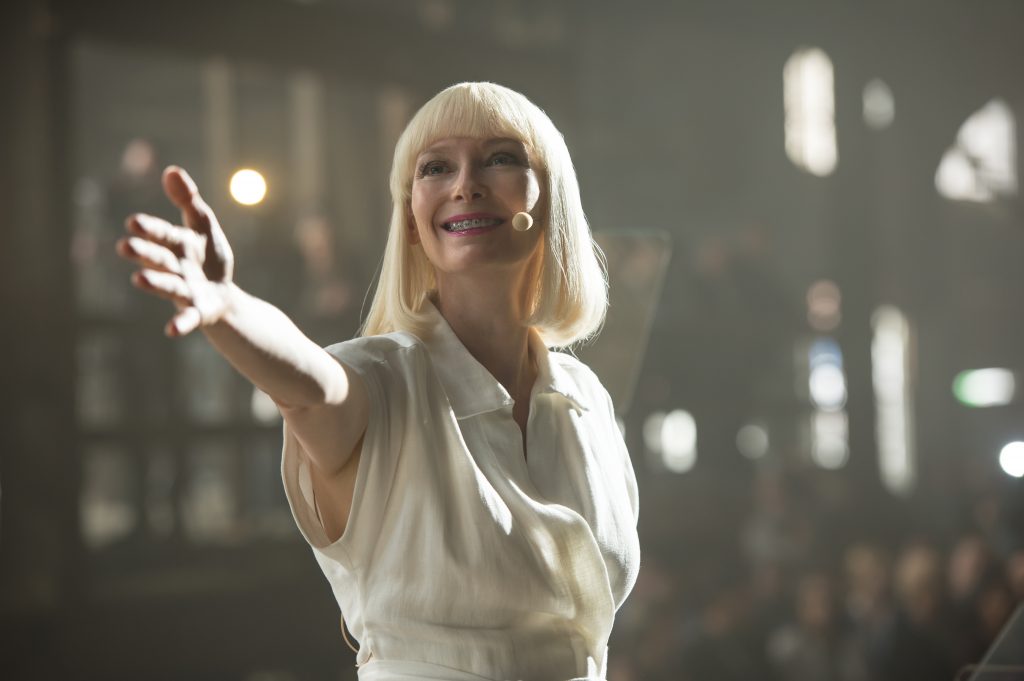
Tilda, there was a similar fanaticism shown by Lucy Mirando in “Okja” and your Minister Mason character in director Bong Joon Ho’s “Snowpiercer” movie. What kinds of outside influences went into portraying someone like these characters?
Swinton: We worked on “Snowpiercer” together—Director Bong and I—and we whipped up this insane burlesque of Mason, who’s supposed to be beyond any reality, but as it happens, it seems we were behind the curve.
And for [Lucy Mirando], we wanted to have the idea of a full-clown villain in a slightly different way. We wanted to find different places of high capitalism and exploitation. And so we decided to split [the characters into twins]. We wanted to look at two different ways of messing the world up. She we had Nancy [Mirando, Lucy’s twin]—who doesn’t fall from the tree of her toxic, horrendous father—and Lucy, who’s so determined to be different. She’s driving 180 degrees from that and trying to be all user-friendly and woke and squeaky-clean and lovable. It was an opportunity to look at these two different places.
I suppose, especially when you’re working together in collaboration over projects, the conversation is kind of the same conversation, but it just evolved into a whole new area. There were all sorts of conversations we had about Mason sort of moved into conversations about Miranda. So they are cut from the same circle—and they all have teeth!
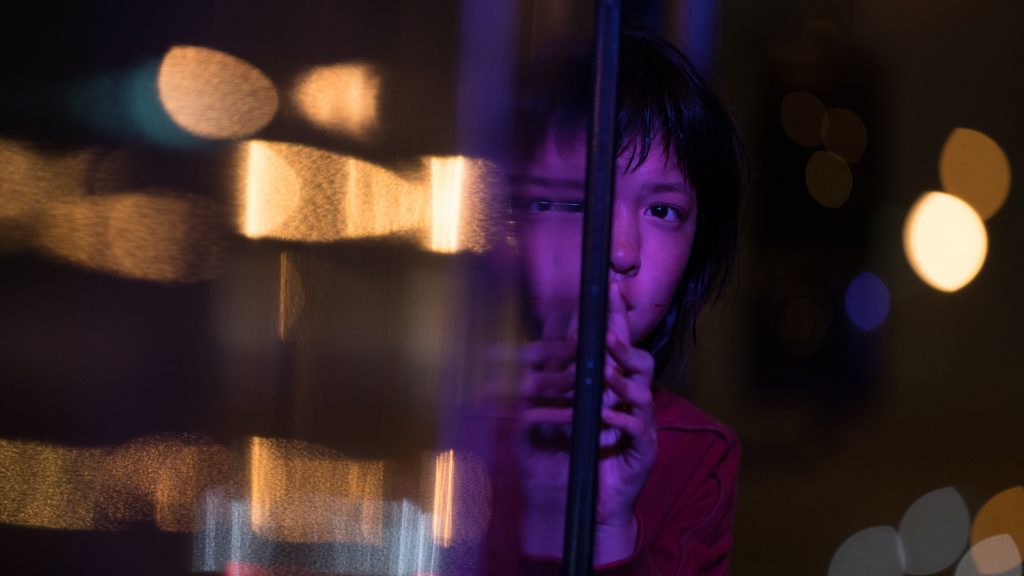
Director Bong, what is about monsters that make them so effective in talking about social issues?
Bong: I’m always drawn to creature films … [which usually] have the monster attack people. But in “Okja,” the creature was a very intimate friend of the protagonist, Mija. They stick together, they have lots of interaction, and they hug each other. It required a lot of cutting-edge visual effects work, which was the first challenge.
When I contemplate why I chose a pig as the animal, there’s no better animal than a pig that humans associate with food. There’s ham, sausage, jerky, etc. In reality, pigs are very delicate, sophisticated and smart. I think the true aspects of how we look at animals are coalesced inside a pig.
There’s one aspect where we look at animals as family, as friends, as pets. And the other perspective is when we look at animals as food. Those two aspects co-exist inside a pig. In our everyday lives, people try to separate these two universes. We play with our pets during the day, and at night, we have a steak dinner. But in this film, we tried to merge those two universes together and create a sense of discomfort. Like you said, a creature is a very effective tool to create social commentary in the world that we live in.
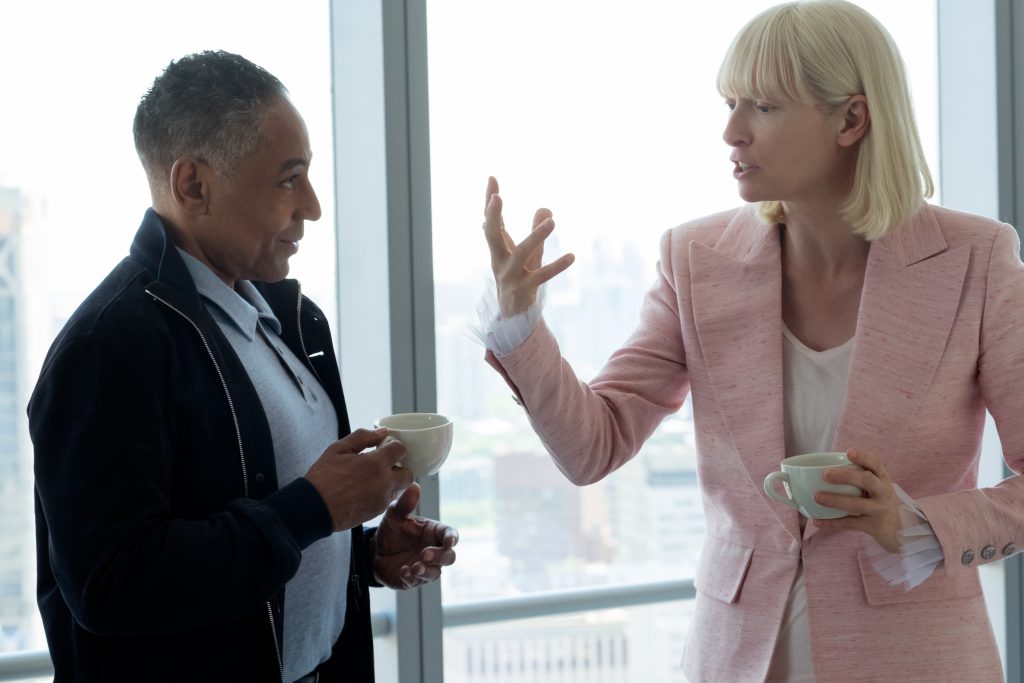
After doing such an unusual movie like “Okja,” where there’s a lot of absurdity in reality, do you go from here?
Esposito: We’re in that moment now in society. We’re right where should be. When I think of it, I think of working with people who have an interesting vision, who are deeply interconnected with pleasure and entertainment but also allowing my intellect to soar and my imagination to also take off and take wings. So when those get connected, you can’t help but leave this particular film without it resounding in your head. You not only were entertained, but you also have something to think about that is relatable to your life. I don’t know what’s next for me or any of us as actors, but we certainly hope to have the opportunity to work with visionary directors who have something to say, not just something to blow up.
Dano: I’ve always felt that the more personal something is, the more universal it can be. I think whatever means something to me is hopefully going to mean something to somebody else. I don’t know what that is. I think it’s different for everybody. I can’t think about it externally. I think it has to come through and then hopefully it speaks to somebody, whether it’s a big, absurd revelation or something very intimate or whatever the medium is.
Collins: I very much agree with the all sentiments that were said already, but for me, I just want to start conversations. I just want to do films that prompt conversations, whether they’re positive, negative or indifferent—ones where you leave wanting to know more and wanting to watch the film over and over again. I’ve always been a fan of people watching. I find that sometimes when you create a character and you think, “Oh, that’s too much.” And then you walk down the street and you think, “Yeah, it’s too little” or “That’s so subdued.” And then you watch someone and you think, “Actually, that more the way I want to go with it.”
I’m constantly surprised by human nature and humanity. And I think that’s why I love what I do, because I love to storytell and bring new characters to life. And every time I play a character, I discover more about myself as a human being. But I surround myself with interesting people. It doesn’t matter that I’m in this industry, I think in life, we want to surround ourselves with people who make us think and question ourselves. Those are the types of films I want to do and the types of characters that I hope I get to continue to play.

Did working on “Okja” affect the way you felt about animal-rights groups, how GMOs are used, and the corporate responsibility of the food industry?
Collins: I’ve always been weirdly interested in food documentaries. During the prep for this movie, I watched more. Director Bong gave us this ALF [Animal Liberation Front] handbook. I saw this really difficult images of animals and their treatment and the facilities. I’m not a red-meat eater anyway, so it wasn’t necessarily that I changed my food habits or eating habits, but I definitely became more of a conscious consumer in many other types of products.
I think the great thing about this film is that it speaks to so many different types of themes—nutrition, environment, politics, love, innocence lost. There’s just so many different things to be taken from this film that are dealt in a way that never tutorialize but always prompt conversation. I feel like what Director Bong is so amazing at is taking so many different things and presenting them to you—never telling you how to think, but if you leave the theater thinking something, then we’ve done our job right.
Yeun: I really enjoyed working with Director Bong mostly because he likes just to tell it to you how it is with all the gray. And so when you get to dive into something like the ALF, I know that we were playing a characterization of people who are really doing stuff like this. I feel like one thing it sheds a light on—at least for myself—is “Why does an individual sign up for something like this?”
And they’re all different, especially in our own [“Okja”] little subgroup of the ALF. Every single character had a different reason for being there or had different ethics that [made the individuals] willing to go farther or less than the other person next to them. It was an interesting study in that regard, because sometimes you see the ALF, as they intend, to be this giant, glob organization. But when you take apart the specific individuals who take part in something like this, it’s interesting to see that not all of interests necessarily align.

How did you reconcile that many of the protagonists in “Okja” condemn violence yet they use violent methods to achieve their goals?
Bong: There is definitely a level of contradiction in the ALF. Even in the film, the ALF [members] shout that they hate violence, but you can see throughout the film that they constantly inflict it. They have a very noble cause—you can understand the cause—but the film also portrays them to at times look foolish and making very human mistakes. They’re humans just like us.
Mirando isn’t a villainess in the pure sense. She has her flaws and fragilities … So whether that be people in the Mirando corporation or whether that be the ALF members, he wanted to embrace them within the boundaries of humanity where they make flaws and make human mistakes.
Dano: Just thinking about what Director Bong said, I was thinking how complicated it is to put a beautiful young girl in the middle of all that contradiction. It’s really one of the special things about the story. It’s a curious line between somebody like [my
Okja” character\ Jay and somebody like Lucy. Jay’s cause seems a lot nobler, but I think we believe in our own causes to the extent that it causes us to do something we don’t want to do, and often without knowing it or being able to justify it or look the other.
I like that the film, even though it has many topical issues, I don’t think it’s really preaching. It’s too complicated for that. Mija eats chicken stew, but she catches a little fish and thrown the fish back in [the water]. That’s such an important detail for this film to be true. And even though it has a fantasy-animation-graphic-novel sort of level to it, I like the truth in the contradictions.

To the actors, what was your initial response when you read the “Okja” script?
Collins: Finally! Here’s something so bizarre and great. The tag line is about a little girl who goes after her best friend that’s a pig. To be able to play a small part in such a big message is something I jumped at the chance to be a part of. My first meeting with Director Bong was at 11 a.m., and he orders ice cream and starts talking about this pig.
And I was like, “Okay, I think I know what I’m signing on for.” I fell in love with the idea that he could see me as this character. And I don’t think a lot of people would be able to see as someone like this, but it’s so much a love story and a drama and a comedy and an action movie and a fantasy movie. It’s kind of everything you wanted to see in one movie. It was a moment of enlightenment when I read it.
Esposito: For me, in many ways, it was a return to innocence. It’s odd for me to say, having played Frank Dawson, but this story is absolutely beautiful in its very connected relationship message. It doesn’t matter what that relationship is. It could be a child with their goldfish in a tank who is their best friend, or it could be Okja.
But that warmth, that sensitivity and that understanding that’s developed in that relationship, for me, guided me back to think about my loss of innocence. When did I grow up? And how can I un-learn that growing up and see the world in a new light? Many times, we are so smart that we are ignorant. And they say that education is learned ignorance. We as performers fantasize about telling our stories that will make a social comment or political comment or artistic comment are gifted with the ultimate gift: to be able to remain somewhere in our heart and soul that beautiful child that Mija is.
Swinton: I didn’t read the script for a long time because I was part of the cloud of the idea before it ever came to script stage. And I remember very clearly when we went to Seoul for the premiere of “Snowpiercer,” he drove us to the airport the next day and leaned over the seat of the car and showed me this drawing of a pig and a girl. And that was it. That was about three years before there was a script.
But even before that moment, I have to say it was one of the things Director Bong and I share is a love for the great director Hayao Miyazaki—in particular, “My Neighbor Totoro.” In fact, we regularly sing “Totoro” tunes. And so the second I saw the story, I saw that, and I saw an opportunity to fill to that homage. But also, we talked about the twin sisters in “Spirited Away,” which I think was a seed of the Mirando sisters. I was in before [the script] existed. Put it that way.

Do you think people will find the Okja creature adorable beyond the film?
Esposito: Okja dolls! Okja pillows!
Swinton: I think young children will be asking their parents, “Where are Okja reservations? Is there are Okja [section] in zoos?” They’ll be looking on Wikipedia for an Okja page.
Bong: Our visual-effects supervisor Erik-Jan De Boer did such a wonderful job. It looks so real in the movie. I was very happy reactions from some people. I wish I had an Okja in my house. I worked with Erik for over a year, striving for realism. With a cartoonish character, you can’t really draw from those kinds of emotions. We have to look at something realistic.
Swinton: Mija has such a sensual relationship with Okja. Don’t we all want to fall asleep on Okja’s belly? It’s really a feeling of physical comfort.



























